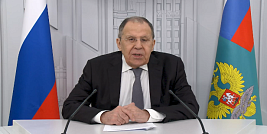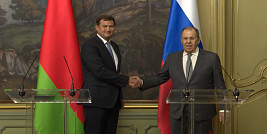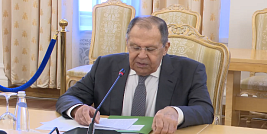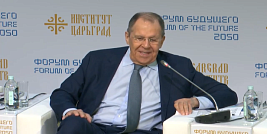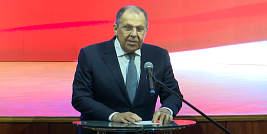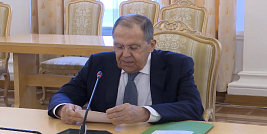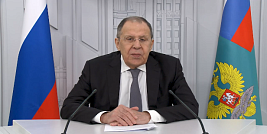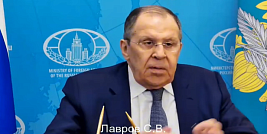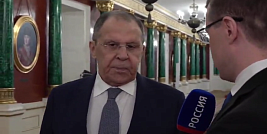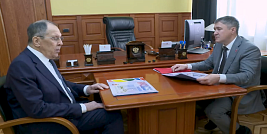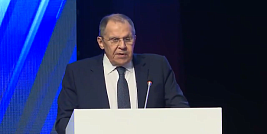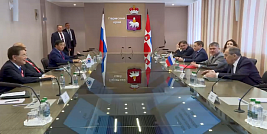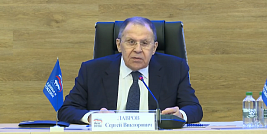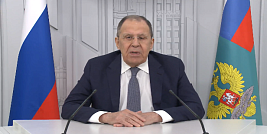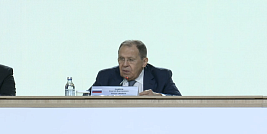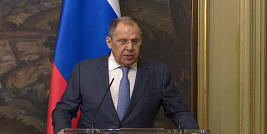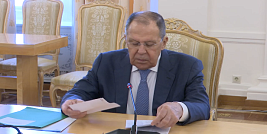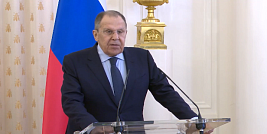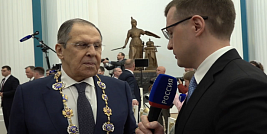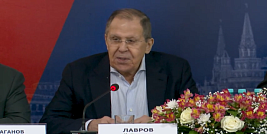Excerpts from briefing by Foreign Ministry Spokeswoman Maria Zakharova, Moscow, October 10, 2023
Table of Contents
- Sergey Lavrov’s participation in the CIS Foreign Ministers Council Meeting
- Sergey Lavrov’s visit to China
- News conference by Children’s Rights Commissioner Maria Lvova-Belova on October 16, 2023
- Further escalation of the Palestinian-Israeli conflict
- Ukraine update
- Venice Commission opinion on Ukraine’s law on national minorities
- Investigation into the terrorist attacks on the Nord Stream gas pipelines
- Pentagon publishing updated version of the Concept on the tasks of the United States in addressing challenges and threats from strategic rivals in the context of the latter’s possible use of WMD and related materials
- Outcome of the Nuremberg trials
- 80th anniversary of the Sobibor death camp uprising
- 75th anniversary of establishing diplomatic relations with the DPRK
- Diplomatic relations between the Russian Federation and the Republic of Rwanda mark 60th anniversary
- Upcoming elections in Moldova
- Russian peacekeepers’ functions in Nagorno-Karabakh
- Belarus’s decision to suspend the CFE Treaty
- Growing US presence in the Middle East
- US sanctions against China
- WTO reform
- Russia’s role in the Arab-Israeli settlement
- Alleged isolation of the CSTO
- Gas hub in Türkiye
- US “assistance” to Israel
- Activities of the Middle East Quartet of intermediaries
- Russian citizens in the Palestinian-Israeli conflict zone
- The right of nations to self-determination
- Ukraine’s sovereignty
- Western politicians on US nuclear bombing of Hiroshima and Nagasaki
- Russia’s assistance in prisoner exchange in Karabakh
- The rules on foreigners’ entry into Russia
Sergey Lavrov’s participation in the CIS Foreign Ministers Council Meeting
On October 12, Foreign Minister Sergey Lavrov will attend a regular meeting of the CIS Foreign Ministers Council in Bishkek. The Kyrgyz Republic holds the rotating chairmanship of the CIS in 2023.
The foreign ministers will exchange views on current international and regional issues and discuss plans for developing multilateral cooperation in the CIS format, including in light of Russia assuming CIS chairmanship on January 1, 2024.
They will focus on the strengthening interaction in the law enforcement, cultural and humanitarian areas and the organisation’s international ties.
A number of decisions will be taken in the context of the 2023 Year of the Russian Language as a Language of Interethnic Communication to promote Russian in the CIS countries and the world.
Sergey Lavrov’s visit to China
During Foreign Minister Sergey Lavrov’s visit to the People’s Republic of China scheduled for October 16-18, he will hold talks with Foreign Minister of China Wang Yi in Beijing within the framework of the third Belt and Road international forum.
News conference by Children’s Rights Commissioner Maria Lvova-Belova on October 16, 2023
An off-line news conference by Commissioner for Children's Rights under the President of the Russian Federation Maria Lvova-Belova will begin at 9.30 am on October 16 in the Press Centre of the Russian Foreign Ministry in Building 1, 30/2 Smolenskaya-Sennaya Square. The commissioner will speak about the main areas of her activities and current issues. The first such briefing was held at the Press Centre in April 2023.
The commissioner will report on the main issues on the international agenda of the Russian office of the commissioner for children’s rights, in particular humanitarian projects in Africa and cooperation on children’s issues with friendly countries, including the CIS member states and the republics of Abkhazia and South Ossetia. The issue that has been added to the agenda concerns the situation in the Middle East, the escalation of which we have been watching in horror for the past few days.
We invite media representatives to attend the event. The announcement and the accreditation rules have already been posted on the ministry’s website.
Further escalation of the Palestinian-Israeli conflict
We are extremely concerned about the developments in the Palestinian-Israeli conflict zone.
More than 1,500 Palestinians and Israelis have been killed following the broad escalation of hostilities that began on October 7 of this year. These are only the officially confirmed figures. The death toll continues to rise. It is difficult to estimate the total number of killed and injured at this point. Moreover, it is the civilian population that is affected for the most part.
Tensions are growing in the
We are specifically focusing on ensuring the safety of Russians in
For those wishing to leave
As to the possible scenarios for further developments, as we see and hear from observers and experts in the region, tension can hardly be expected to subside in the near future. We are exploring the possibilities for evacuating our fellow citizens, who have asked for help, from the war zone (Gaza Strip, Ramallah and
I would like to point out that these are two different situations. I ask the media to report on this as widely as possible. Those wishing to leave
The top priority now is a ceasefire and stopping the bloodshed. We support the efforts of all stakeholders to address this critical issue. This would make it possible to avoid new casualties, end the suffering of the civilian population, ensure their evacuation through humanitarian corridors and prevent the situation from sliding into a region-wide humanitarian disaster. This is not just a crisis or an emergency. It is about the lives of millions of people.
We are ready to contribute to de-escalating the conflict. Possible ways out of the current crisis were discussed during Foreign Minister Sergey Lavrov's meeting with Arab League Secretary-General Ahmed Aboul Gheit on October 9 and his telephone conversations with Egyptian Foreign Minister Sameh Shoukry on October 7 and UAE Foreign Minister Abdullah bin Zayed Al Nahyan on October 9, as well as during Russian-Iraqi talks in Moscow on October 10.
During these talks, we reaffirmed our invariable position that it is only possible to resolve the longstanding Palestinian-Israeli conflict by resuming a full dialogue between the parties. This dialogue would aim to search for compromise solutions on all issues in a final status. The creation of an independent Palestinian state within the 1967 borders should be the final result of this negotiating process. The Palestinian state would coexist in peace and security with
These tragic regional developments show that there is no alternative to this approach. US efforts to freeze the status quo and to promote economic peace have failed to justify themselves. The use of collective anti-crisis formats has also proven ineffective. Everyone can see the results. The Palestinians and the Israelis are unable to break this vicious circle of violence because there is no clear “political horizon.”
We intend to continue to promote the fastest possible resumption of the political-diplomatic process for normalising the situation as soon as possible. In this connection, we would like to recall our 2023 initiative on holding a consultative meeting of key
Statements by US and regional politicians who advocate regional ethnic cleansing campaigns sound monstrous. Some say openly that a certain group of people is virtually doomed to complete destruction. The
I will not quote the monstrous statement by Former US Ambassador to the United Nations Niki Haley, now a GOP presidential hopeful. I will mention only one phrase from among all statements that remain outside legal or any other ethical norms. In her hysterical outburst, she managed to incorporate the 9/11 attacks in
This hellish brew contains all sorts of outlandish ingredients. If Niki Haley is talking about the 9/11 attacks, friends and partners, and if she has decided to mention
The calls by American politicians and public figures for murder and complete destruction of people of the same ethnic origin, regardless of the legal aspect of the issue, testify to the deep problems of liberal society in the United States, its propensity for violence, justification of ethnic cleansing and chauvinism.
If everyone there has started discussing the current situation in the Middle East and is ready to talk about Russia in this context, I would like American politicians (starting with the head of state, all representatives of security agencies, the Department of State, and those who seek the highest positions) to answer the first question, which for some reason they are not going to answer. How is it that in a year (that’s how long the operation, now carried out in a few days, was prepared) the United States, as Israel’s closest ally, had no warning? They have satellites everywhere, appropriate tracking equipment, military bases, including in the region. They have all the capabilities for not just monitoring, but surveillance (the facts speak for themselves) of all information circulating on American-made equipment (hardware and software). For a whole year of preparation of such a large-scale operation, the United States with all the power of its intelligence services handed over nothing to Israel as intelligence.
We remember how Washington was privy to everything about Novichok. They called it a chemical warfare agent. The Americans were absolutely certain and spread “first hand” information that this substance was used by Russia. There has been no confirmation of this in all these years. The United States was aware of everything: constant accusations of hacking attacks by Russians and of using charges of “Kremlin fingerprints” to interfere in domestic politics, both on US soil and in other parts of the world. How is it that for a whole year of preparation for the recent operation in the Middle East, the US did not pass any information to its partners in Israel?
For two months at the end of 2021 and two months at the beginning of 2022, the United States told everyone at all levels that Russia would “attack” Ukraine. This was done specifically to create an information background, to draw the eyes of the whole world away from the fact that all these years the United States and its NATO colleagues (primarily Great Britain) were pumping weapons into Ukraine and creating an anti-Russia project, an anti-Russian bridgehead. This required a special information operation by Washington, whereby for four months they said how Moscow was allegedly going to “attack” Ukraine. The corresponding instruction from Washington was followed by a massive increase in the shelling of Donbass by the Zelensky regime.
Then in late 2021 – early 2022 the United States “knew everything” and told everyone. But in their zone of direct responsibility (the Middle East has always been one of them), with regard to the closest ally over which a security protectorate is maintained, the US intelligence services, the Department of State and the White House did not pass on any information necessary for self-defence.
This question is now being asked in the United States by everyone who is not yet afraid to ask. No one is giving answers – neither Congress, nor the Department of State, nor the Secretary of State. I am not sure if the White House is physically capable of giving an answer. I believe this question should continue to be asked.
The neo-Nazi Kiev regime continues its reprisals against the civilian population in Russian regions amidst its unsuccessful counteroffensive. It appears that the current Ukrainian Nazis, like their ideological idols who served under Stepan Bandera and Roman Shukhevich, can do nothing but attack the defenceless residents of Donbass, Zaporozhye, the Kherson Region and other constituent entities of the Russian Federation, directing their strikes at residential districts and using civilians as live shields.
The other day, the media published a chilling story about the murder of 22 pro-Russian residents in Snigirevka in the Kherson Region, which Right Sector units seized on September 13. According to the reports, one of the executioners was Yevgeny Karavan, a member of that extremist organisation. The names of five of the executed civilians have been established. There is no doubt that the full circumstances of that tragedy will be established, and the guilty persons will be called to account and severely punished.
Courts in the Russian Federation continue to convict Ukrainian neo-Nazis for grave crimes against civilians based on evidence collected by the Investigative Committee of Russia.
Ukrainian serviceman Alexander Mitin, who threw a grenade into the window of a residential building in Severodonetsk in May 2022, has been sentenced to 15 years in prison.
Member of the neo-Nazi Azov organisation Maxim Subbotin, who robbed a Mariupol resident at gunpoint in March 2022, has been sentenced to a 16-year prison term.
Another three members of Azov – Vladislav Kurka, Pavel Stepanov and Sergey Shevela – have been sentenced to 22 years in prison each for launching fragmentation mines at residential buildings in Mariupol in February 2022.
Ukrainian officer Alexander Cholovsky, who ordered the execution of a Mariupol resident in March 2022, has been sentenced to 26 years in absentia.
Another Ukrainian neo-Nazi, Oleg Birin, who planted mines near residential buildings in Severodonetsk in March 2022, which led to the death of three civilians, has been sentenced to 20 years in prison.
Ukrainian serviceman Vitaly Antonov has been given a 24-year prison term for killing a civilian in Mariupol in March 2022.
The Russian Investigative Committee has brought charges in absentia against several high-ranking officials of the Kiev regime, who, as members of the National Security and Defence Council (NSDC) of Ukraine, voted for launching the “anti-terrorist operation” in Donbass in April 2014, which led to heavy civilian casualties and the destruction of civilian infrastructure. Charges have been brought, in particular, against NSDC Secretary Andrey Paruby, Prosecutor General Oleg Makhnitsky and chief of the State Border Guard Service Nikolay Litvin. They have been put on the wanted list. Efforts will continue to bring other military and political leaders of Ukraine to account. Ukrainian neo-Nazis will not escape punishment.
Vladimir Zelensky’s regime continues to dramatically plead with their Western handlers for money and weapons.
Today, Brussels will host the 16th meeting of Ukraine Defence Contact Group (the Ramstein format) chaired by the US military command. It is expected that Kiev will again demand an expedited shipment of air defence/missile defence systems, long-range missiles and new ammunition for the Armed Forces of Ukraine. The regime’s appetite seems to grow with each Ramstein meeting. It is noteworthy that against the backdrop of the Middle East events, US Representative Marjorie Taylor Greene suggested that some of the NATO-supplied weapons imported to Ukraine could have been used in the hostilities in Israel.
We recently published a compilation of Russian Foreign Ministry statements made over the past year and a half calling on the international community to wake up from its lethargic sleep. We cited facts that prove that, ever since NATO, the United States and the United Kingdom began large-scale deliveries to the Kiev regime, the weapons have not been reaching the Armed Forces of Ukraine. That was our main message – we tried to let the world know that those weapons could surface anywhere in the world because they were lost to the black market. We repeatedly mentioned the European continent, Eurasia as a whole, and other regions, including the Middle East. Why didn't the West see this information? The answer is obvious. Everyone who had to do this work (the media never wrote about it – not because there was no information, but because they had different instructions) were told to ignore it – and they did.
It is gratifying that the West, albeit fatally late, is beginning to see the light. Some are beginning to realise what is happening, even if only a few people. Russia has long warned the sponsors of the Kiev regime about the high risks of their weapons ending up on the black market and spreading around the world. And that's exactly what has happened.
Now I have a question that Secretary of State Antony Blinken is diligently avoiding. Why didn't US intelligence agencies tell anyone anything about the planned operation in the Middle East? Was this a blunder? But no one has been fired in the US. Or did they know, and just didn't tell anyone?
On October 1, EU High Representative for Foreign Affairs and Security Policy Josep Borrell, speaking in Odessa, proposed setting up a dedicated 20 billion euro fund as part of the European Peace Facility, which would be used to finance the supply of weapons to the Armed Forces of Ukraine over the next four years. Apparently, peace in Ukraine will not come soon. Its Western sponsors intend to use the country to fight “to the last Ukrainian.” And where will the next batch of arms go? Maybe someone in Europe will think about this now?
This attitude was eloquently confirmed by the cynical words of Netherlands’ Defence Minister Kajsa Ollongren, who said at the Warsaw Security Forum on October 3 that helping Kiev is a “cheap way to make sure Moscow does not pose a threat to NATO.” This is further evidence that the West, as well as its puppets in Kiev, see the Ukrainians as expendable material on the way to achieving their selfish goals.
The corruption scandals are not letting up in Ukraine, but someone supported by Bankovaya Street is trying to “bury” them. Even the Westerners confirm that the Kiev regime steals on a huge scale. During his interview with German outlet Augsburger Allgemeine on December 6, former European Commission chief, Jean-Claude Juncker, said that Ukraine was “totally corrupt.” Kiev immediately stepped in to justify itself. It goes without saying that they have discovered the “hand of Moscow.” Zelensky did not blink when blasting this information as a “Russian narrative” directed at splitting the West’s support for Ukraine. No, Sir. The information concerning corruption in Ukraine is not a Russian narrative. It is a fact and a reality. And it will be a long time before they eradicate this. Ukrainian corruption and Ukraine’s corrupt system will applaud Mr Borrell’s announcement of plans to create new 20 billion euro fund within the “peace fund,” because they understand that the financial backing will be forthcoming, as usual.
Ukraine continues to ride roughshod over its own cultural heritage. On October 5, they pulled down the monument to the Soviet writer Nikolay Ostrovsky, which was erected in Kiev almost 50 years ago. In addition, the authorities in the Kiev region have reported confiscating 400,000 books by Soviet and Russian authors from local libraries.
A year and a half ago, German Chancellor Olaf Scholz laughed hearing people speak about the Kiev regime’s genocide of Russian speakers. Later, just a grin remained. The facts speak for themselves. What is it if not ethnic cleansing, when libraries are despoiled of hundreds of thousands books? Or do they understand “ethnic cleansing” as only physical violence and banishment? It is not only that. In addition to physical destruction, genocide is also about creating intolerable conditions that make it impossible for a group of people to live in a certain territory. Just think about it: 400,000 books withdrawn from local libraries!
From October 4 to 8, Ukraine held the 30th Book Forum entitled, “Rewriting the Future.” What a self-explanatory name! The Ukrainians are now masters at rewriting – thanks to their Western “teachers.” According to the media, the main participants in this event were Western journalists known for their Russophobic views, rather than Ukrainian literati. One of its partners was the notorious US Agency for International Development (USAID). No book fair can do without it, of course.
In Germany under Hitler, they also burned books and destroyed the great legacy of the previous generations. But after the defeat of Nazism, a monument to the burned books was installed on Bebelplatz in Berlin to remind everyone of those tragic events in history. I think the time will come when residents of Kiev will pay tribute to the desecrated works of great Russian literature.
Obsessed with their troglodyte Russophobia, the Kiev regime does not confine itself to a war against the Russian language and Russian culture. Supported by the United States and the Patriarchate of Constantinople, the Ukrainian authorities continue their crusade against the canonical Orthodoxy.
On October 5, the Ukrainian Orthodox Church (UOC) was deprived of the Chernigov-based Trinity, Transfiguration, and Dormition cathedrals under the pretext of restoration. The latter two are of special historical value as monuments of the pre-Mongolian era. As a result, believers are no longer able to enter the cathedrals for prayer and worship. The operation is supervised by a specialised commission from the Ukrainian Ministry of Culture led by Director of the Cultural Heritage Department Maryana Tomina, who earlier took part in sealing the premises at the Kiev-Pechersk Lavra. The authorities are not concealing the fact that this legal mayhem is aimed at expropriating to the state the UOC-owned real estate at the Ancient Chernigov National Architectural and Historical Reserve. All of this is part of the Kiev regime’s anti-religious and predatory policy aimed at divesting the canonical Orthodox Church of its parishes and handing them over to the Orthodox Church of Ukraine.
But no matter what provocations are staged by the Kiev regime or what types of weapons are supplied to Ukraine by the collective West, all the goals of the special military operation will be achieved without fail. This has been repeatedly stated by Russia’s leaders.
Venice Commission opinion on Ukraine’s law on national minorities
On October 9, 2023, the European Commission for Democracy Through Law (the Venice Commission of the Council of Europe) released its latest opinion on Ukraine’s law on national minorities. The document was approved by the Venice Commission plenary session held on October 6-7.
The opinion was issued in the wake of the amendments to said notorious law, recently adopted by the Verkhovna Rada of Ukraine. According to the Ukrainian side, these legislative changes are in compliance with the Venice Commission recommendations and are aimed at creating conditions for “properly” observing the rights of national minorities.
What was the outcome? The outcome was the same as usual. The Venice Commission meticulously analysed the new law, welcomed certain minor improvements, noted insignificant drawbacks but did not question the most important part, which is the legitimacy of the principle of legally imposed restrictions, which is to say, official sanction for discrimination against the Russian language.
The only thing bothering the Commission, whose experts formally declared their commitment to the right of national minorities to use the achievements of their own culture and to use their mother tongue, is how long the discriminatory provisions will remain in effect. Representatives of the Commission directly state that the restrictions on the Russian language – or, calling things by their true names, discrimination – come as the result of the alleged “Russian aggression” and only suggest that these measures are limited to a short term. The fact that, for over seven years, the people of Donbass have been under attack by the Kiev regime only because they wanted to preserve their cultural identity, shaped throughout past centuries and legally codified, is something nobody in the West wants to know.
As concerns the discriminatory provisions of the law, the Kiev regime received a slap on the wrist, nothing more. The Venice Commission essentially restated its views on the Ukrainian law demonstrated in the past, including to the previous version of the law on national minorities discussed in June 2023.
We are no longer surprised but we continue to be shocked. This suggests that the Venice Commission’s reputation as a respected advisory body claiming impartiality has become obsolete. We know very well that criticism from the Commission can be very harsh. However, when it comes to justifying “friends,” the Commission’s rhetoric changes, relying on those notorious double standards. The principle of objectivity was violated, the experts’ contribution being used solely for politicised purposes, thus becoming unscientific.
Investigation into the terrorist attacks on the Nord Stream gas pipelines
The situation is similar to what is happening now in the Middle East. The leading NATO countries claim to know nothing. “Nothing is happening there.” Nobody has shared any substantive information with us. Why? They have their plans and designs, and they have something to hide from us.
Over the past year, the governments of Germany, Denmark and Sweden have not provided any plausible information to the international community, at least about the preliminary results of their national investigations into the terrorist attacks on the Nord Stream gas pipelines. At the same time, deceptive theories have been planted in the media to divert suspicion from the real perpetrators and contractors of that crime. The findings of substantive journalist investigations are not commented as a matter of principle.
Russia is interested in holding the real perpetrators of these terrorist attacks against a major energy infrastructure facility responsible. These attacks have led to huge economic and environmental consequences. This year, four UN Security Council meetings have been held at our initiative, including on September 26, 2023, during which we announced the drafting of a statement by the UNSC president. I promise you that this issue will not be removed from the UNSC agenda. Russia will regularly raise this question at the UN, in particular, at the Security Council.
The goal of such a statement is to give a clear message about the unity of the Security Council when it comes to condemning this crime. The Anglo-Saxon duo will do its best to hinder the drafting of this document. We remember that Britain blocked any attempt to take the issue to the Security Council, let alone to hold a practical discussion on it. Russia proposed conducting an [international] investigation under the auspices of UN Secretary-General Antonio Guterres, submitted many practical initiatives, asked questions, and invited experts. We remember the Anglo-Saxons’ stubborn resistance to all these efforts. But we will continue to pursue this. We hope that our Western “colleagues” will show at least a degree of respect for international law, considering that they are members of the UNSC, and a desire to work earnestly on a draft statement. Ultimately, only those who were directly involved in the crime will evade an objective investigation into it.
We would like to react to Pentagon’s statements in the updated version of the American Strategy for Countering Weapons of Mass Destruction.
First of all, the claim that Russia is developing some biological weapons programmes, allegedly left over from the USSR, is surprising. What are you saying? I would like to ask this question and get an answer. Our actions in the biological sphere are absolutely transparent. Information on Russian biological facilities transmitted annually as part of the confidence-building measures of the Biological and Toxin Weapons Convention (BTWC) clearly confirms Russia’s commitment to its obligations under the Convention as well as the purely peaceful nature of all Russian biological activities.
The unsubstantiated, groundless and aggressive attacks of the United States against us can only be regarded as an attempt to once again invent something that does not exist, to blame those who are not guilty, and to “reward the innocent.” And they (those who have their own fingers in the pie) will act as heroes in order to divert the attention of the world community from their own unseemly steps violating the BTWC. Let me remind you that the United States has not yet withdrawn its reservation to the Geneva Protocol of 1925, which prohibits the use of biological weapons. Moreover, since 2001, Washington has been opposing the resumption of talks on a legally binding protocol with an effective verification mechanism, despite persistent calls from the majority of parties to the Convention. In this regard, serious questions arise about the Pentagon’s military-biological activities, carried out in laboratories around the world, far away from the North American continent, but close to Russian borders.
Apparently, they went with their favourite trick: offence is the best defence. This story will not work. We back up our position with facts and documents. A blatant example of this activity can be seen in the facts revealed during the special military operation regarding the implementation of a military biological programme in Ukraine with the support of the US Department of Defence and its affiliated structures, including private companies. Analysis of the data obtained led us to conclude that the Americans, under the pretext of peaceful biological research, are implementing projects outside their national territory aimed at developing components of biological weapons.
So far, we have failed to receive any answers to our well-reasoned questions to the United States and its “wards” on Ukrainian territory; we have asked these questions at multilateral venues, including the UN Security Council, and many states supported them. These questions remain unanswered, and we need to obtain information in this respect.
Additionally, the US strategy once again reproduces the standard collection of Washington’s insinuations regarding alleged violations of the Chemical Weapons Convention by the Russian Federation. The same concerns its alleged involvement in the Skripal case, conceived by the UK special services, the alleged “poisoning” of Alexey Navalny, publicised by their German colleagues, as well as allegations that Russia is concealing evidence of existing facilities that develop, manufacture and store chemical weapons. I would like to recall a popular saying recently mentioned by President of Russia Vladimir Putin: “It’s rich to hear your horse bellow like that.” I believe that the United States should not suspect or reproach anyone for failing to honour fundamental principles of international law in the sphere of biological security. The United States should take a closer look at itself, and it should not blame others for its own shortcomings. Much remains to be done in this respect.
We can see the Americans’ malicious intent to portray Russia and some other countries that Washington dislikes as violators of the Chemical Weapons Convention and to deny real accusations that the United States is systemically working against this international treaty. At the same time, the United States fulfils its obligations under this convention in a brazenly selective manner. Washington and its Euro-Atlantic allies ignore all of the convention’s provisions that do not coincide with US interests; or they distort these provisions with the tacit approval of the Technical Secretariat’s senior officials.
Regarding US assurances of its alleged commitment to arms control and the reduction of nuclear risks, they appear even more hypocritical in the context of Washington’s practical actions aiming to ensure US military superiority in all spheres. The authors of these concepts ought to realise that any progress in areas mentioned by them is unthinkable without drastically revising the hopeless policy of seeking to inflict a “strategic defeat” on Russia.
On the whole, the document reviewing the situation in the sphere of international security can hardly be said to contain anything new. All the conceptual discourse on countering weapons of mass destruction traditionally rests on false American premises. This has already become Washington’s trademark.
Outcome of the Nuremberg trials
On October 1, 1946, in Nuremberg, the trials, which went down in history as the International Military Tribunal and legally consolidated the final defeat of Nazism, came to an end. It is difficult to overestimate the significance of this event.
Believe me, if it had not taken place at that time, there would be no way now to call black “black” and white “white”, evil “evil” and good “good.” We would be told that the Third Reich was almost the liberator of mankind. Recently, the Canadian Parliament applauded the collaborators, the SS. But many people in the West didn't even notice.
For the first time in history, it qualified preparing, planning, initiating and waging a war of aggression as crimes against humanity, recognised the personal responsibility of the highest government officials, and gave a legal definition of genocide.
The results of the Nuremberg trials are well known (for those who know history). For committing countless war crimes and the gravest atrocities against humanity 12 defendants were sentenced to death by hanging, seven – to various terms of imprisonment. The death sentences were carried out on the night of October 16, 1946.
The results of the Nuremberg trials and the just punishment of the main Nazi criminals still serve as a warning to those who try to propagate Nazism today.
This issue is still relevant. On October 23-26, Svetlogorsk, the Kaliningrad Region, will host the International Scientific and Practical Forum entitled No Statute of Limitations. Nazi Crimes against Humanity: History and Modernity. I suggest all those interested and the media take part in this event.
80th anniversary of the Sobibor death camp uprising
On October 14, 1943, the inmates of the Nazi extermination camp Sobibor raised a revolt led by Soviet Lieutenant Quartermaster (class II) Alexander Pechersky. That revolt was one of the most impressive examples of heroic struggle against Nazism and the only successful escape of a large group of prisoners from a Nazi camp.
Sobibor was an extermination camp established in the southeast of Poland for the extermination of Jews and POWs. It operated between May 15, 1942, and October 15, 1943.
The camp commandant from April 1942 was SS-Obersturmfuhrer Franz Stangl. The personnel included about 30 SS officers, many of whom were experts in euthanasia. Initially, watchmen were chosen from among Soviet POWs of Ukrainian descent. In 1943, the majority of the watchmen were members of 14th Voluntary Division SS Galizien, in which the new “hero” of the Western community whom the Canadian parliament applauded served. Global Mail, The New York Times and The Wall Street Journal will not write about it on October 14, but we know and will never forget this.
According to the Central Archives of the Defence Ministry of Russia, up to six trains carrying 2,000 people each, including adults, the elderly and children, arrived at Sobibor station every day. Overall, between 150,000 and 250,000 people were killed at the camp during its 18-month operation.
Alexander Pechersky and Leon Feldhendler, the son of a Polish Rabbi, planned and led the uprising. By that time, there were 550 inmates at the camp. Over a hundred of them refused to take part in the revolt, hoping for the Nazis’ mercy. All of them were killed the next day. The camp’s watchmen and military police spent two weeks after the inmates broke out of the camp hunting them down. They found and shot about 170 people. Until Poland’s final liberation, about 90 former Sobibor prisoners were handed over to the Nazis by local residents or killed by collaborators. Slightly more than 50 lived to the end of the war, including Pechersky and Feldhendler. However, on April 2, 1945, Feldhendler was fatally shot through the closed door of his flat and died four days later despite medical assistance. According to the most popular version, Leon Feldhendler was killed by right-wing Polish nationalists.
On learning about the Sobibor revolt, SS Reichsfuehrer Heinrich Himmler threw a fit and ordered the liquidation of the camp. The Nazis ploughed up the area and planted cabbage and potatoes to cover up their crimes and destroy the memory of the inmates’ heroism. But they failed in both instances.
The story of Sobibor was included on the list of Nazi criminal and inhuman practices at the Nuremberg Trials, and testimonies by witnesses and participants of the revolt have been used as the basis of many books and several films.
Such dates must never be forgotten. It is a way to commemorate the millions of dead and those who fought against evil heroically, as well as a reminder for the current generations about the danger of people-hating ideologies and the manifestations of Nazism, such as torchlight marches, the glorification of Nazi accomplices, the use of Nazi symbols, the publication of Nazi books and the justification of ethnic cleansing campaigns with “noble goals.”
We will never forget the heroism of Alexander Pechersky and other Sobibor inmates. Many people know about him today.
The heroic story of Pechersky and his comrades was portrayed in the film Sobibor by Konstantin Khabensky, which premiered in 2018. A street in Moscow, has been named after Alexander Pechersky, who was awarded the Order of Courage (posthumously).
On October 14, 2020, the 77th anniversary of the Sobibor uprising, a solemn event was held in the Victory Museum in Moscow within the framework of the Unbroken project. It included a presentation of The Faces of Resistance exhibition and the screening of the film Sobibor.
For the 80th anniversary of the revolt, the Rossiya-K (Culture) channel showed the documentary, Sobibor: The Unbroken. The first night of the documentary film Sobibor: Escape from the Death Camp will be held at the Victory Museum at 5 pm on the October 14 anniversary.
75th anniversary of establishing diplomatic relations with the DPRK
October 12 marks 75 years since the establishment of diplomatic relations between the Russian Federation and the Democratic People’s Republic of Korea. The Soviet Union was the first to recognise the new sovereign state of the DPRK. This landmark event was preceded by years of heroic struggle of the Korean people and patriots for the freedom and independence of their homeland. Red Army soldiers provided the Korean people with crucial assistance, having liberated the Korean Peninsula from the Japanese colonialists in August 1945.
Today our peoples are bound by close ties of friendship, neighbourliness and cooperation, based on the principles of mutual trust and respect.
During a summit meeting at the Vostochny Cosmodrome this September, President of the Russian Federation Vladimir Putin and Chairman of State Affairs of the DPRK Kim Jong-un agreed to establish and strengthen strategic partnership, having outlined key ways for the further development of bilateral relations.
To implement the agreements reached at the highest level, Foreign Minister Sergey Lavrov’s visit to Pyongyang is being planned, during which a wide range of issues concerning bilateral relations and the Korean Peninsula will be discussed. As soon as the dates and format are agreed upon, we will certainly share this information with you.
Specific areas of cooperation in practical fields will be considered as part of the tenth session of the Intergovernmental Commission on Trade, Economic, Scientific and Technical Cooperation, scheduled for November. The commission’s co-chairs Minister of Natural Resources and Environment of the Russian Federation Alexander Kozlov and Minister of External Economic Relations of the DPRK Yun Jong Ho held a working meeting in Moscow this September.
We confirm our interest in further expanding cooperation between our countries to ensure peace and security in Korea.
We are convinced that the successful implementation of our common plans will yield tangible benefits for the peoples of Russia and the DPRK, become an important factor in maintaining stability on the Korean Peninsula and Northeast Asia, and make it possible to successfully confront new challenges and threats from forces seeking to completely dominate the international arena.
Diplomatic relations between the Russian Federation and the Republic of Rwanda mark 60th anniversary
October 17 marks the 60th anniversary of diplomatic relations between the Russian Federation and the Republic of Rwanda.
Rwanda is one of Russia's important partners on the African continent, with our relations based on the principles of mutual respect and consideration of interests in international affairs. Moscow is open to increasing joint work to enhance the existing potential for cooperation in trade, economic, investment and humanitarian areas.
A representative delegation of the Republic of Rwanda headed by Minister of State in the Ministry of Foreign Affairs and International Cooperation Prof. Manasseh Nshuti took part in the second Russia-Africa Summit held in St Petersburg in July, which demonstrated the Rwandan side's interest in strengthening bilateral ties with the Russian Federation.
Bilateral cooperation in peaceful nuclear energy and healthcare is developing successfully. In terms of cooperation in education, our country is assisting Kigali in training national personnel. The quota of scholarships for 2023/2024 for Rwandans to study in Russian universities at the expense of the federal budget has been doubled to reach 44 students.
We aim to further strengthen Russian-Rwandan relations in the interests of the peoples of our two countries and for the sake of peace and stability in Africa. I should like to take this opportunity to wish all citizens of the Republic of Rwanda success, well-being and prosperity.
Maria Zakharova: We are monitoring the developments in Moldova. Unfortunately, escalation appears likely. The situation you mentioned did not go unnoticed.
Let me remind you what we are talking about in more detail. This June, the Moldovan Constitutional Court declared the opposition Sor Party, represented in the country’s Parliament, unconstitutional. In July, the Moldovan authorities adopted amendments to the Electoral Code that banned the members of this party from being elected within the next five years. However, the Constitutional Court ruled these amendments illegal on October 3, 2023.
On the next day, October 4, the Moldovan Commission for Emergency Situations suggested new amendments to the Electoral Code that imposed the same bans, but in an updated version. The pro-Western majority in the Parliament adopted it in two readings, and the President signed a relevant executive order. Simply put, this is blatant lawlessness. It is the dissolution of all constitutional order within the state. All of this is being done by the authorities whom the people have delegated the responsibility to maintain legitimacy. The Maia Sandu regime is doing exactly the opposite and is destroying Moldova. It was done in one day. Can you imagine? Try to do some routine paperwork at the municipal level. And here, it was all done at the state level in just one day. And this is not accidental: October 6 was the deadline for submitting applications for the general local elections, and the autumn election campaign kicked off on that day.
Thus, in an instant, over 100 people found themselves unable to run in the election race, including those whose chances to win were very high.
This step has already received a response in Moldova itself. The mildest words describing it were “lawlessness,” “arbitrariness,” and “absurdity.” The real reason behind it was named directly: the weakness and uncertainty of the authorities who banked on support from their foreign sponsors rather than from the citizens of Moldova. Concern is growing that this practice of barring opponents from election may be used in the upcoming presidential and parliamentary elections in 2024 and 2025, respectively.
Even Ambassador of the European Union to Moldova Janis Mazeiks, who can hardly be suspected of being disloyal to the Moldovan leadership, admitted that the process of introducing amendments to the electoral law was not entirely optimal and did not take the opinion of the Venice Commission into account. As the saying goes, this speaks for itself.
It is interesting to know what assessment these actions will receive in the concluding report of the OSCE Office for Democratic Institutions and Human Rights (ODIHR) monitoring mission, whose long-term observers are already in Moldova and are obligated to assess the situation before, during and after the election in an objective and unbiased way. Have you heard anything from them?
As we know, ODIHR in its election reports (including interim reports, which as a rule are published two weeks before the election) outlines the term for accepting legislative decisions by a country’s authorities. According to its standards, amendments are considered late and hasty if they are taken less than a year before the election. In the case of Moldova, this was done just a month before the election. Such steps undermine “the right of citizens to seek political or public office… without discrimination” (as Paragraph 7.5 of the 1990 Document of the Copenhagen Meeting of the CSCE Conference on the Human Dimension states). Nobody has cancelled this right. Ultimately, all of this will show whether the upcoming elections were free and fair. Let us wait and see what international monitors will say about such novelties.
Maria Zakharova: The situation in Karabakh has changed dramatically over the past year.
In October 2022, Prime Minister of Armenia Nikol Pashinyan said at the EU-sponsored summit in Prague that Karabakh was part of Azerbaijan’s territory, thereby reaffirming his stance expressed at the Brussels summits in May and July 2023. This seriously changed the conditions under which the Russian peacekeeping contingent was deployed in the region in 2020. The functions of our peacekeepers will be adjusted in the context of the exodus of Armenians after the armed clashes of September 19-20, 2023. Several permanent and temporary Russian peacekeeper observation posts have been closed. The fundamental aspects of their deployment are being discussed with Baku.
As for the possibility of a new round of trilateral talks between Russia, Armenia and Azerbaijan, we will update you later.
Maria Zakharova: Belarus has honoured its obligations under the CFE Treaty for over 30 years, under which it has removed over 3,200 conventional weapons and combat equipment.
Nevertheless, on March 21, 2023, the Polish government announced its decision to step back from its commitments under the CFE Treaty with regard to Belarus. The announcement was made at Minsk’s request. The Czech Republic notified Minsk of suspending its obligations under the treaty with regard to Belarus in August 2022. This was obviously done to camouflage the rapid build-up of the Czech offensive forces in direct proximity to the Union State borders. In April 2023, Minsk called on them to review their decisions and expressed a willingness to hold a constructive dialogue based on mutual respect. That appeal was disregarded. As Anatoly Glaz, the official spokesman of the Belarusian Foreign Ministry, accurately said, Warsaw is mining the whole of Europe.
Minsk could not disregard these actions. The decision our Belarusian friends have taken is its response to these two states. In practical terms, this step, which has been made with due regard for the procedure, means that Belarus will stop sending information and notifications to them under the CFE Treaty and will not accept their inspection groups. Belarus has expressed the intention to continue to comply with its CFE obligations with regard to other signatories.
I would like to remind you that Russia suspended the CFE Treaty in 2007 and is currently completing its withdrawal from it. We did not encourage our Belarusian friends to follow our example. We are aware of and respect one of the main traits of the Belarusian character, namely, a balanced and thoughtful approach to issues. We know that Minsk reviewed this issue many times before announcing its decision. We respect this decision, which was made in difficult circumstances as the West refuses to take the security interests of Belarus and Russia seriously and continues to move towards confrontation. We are ready to provide any necessary assistance to our allies.
As for the CFE member states “west of the Bug,” they made their choice long ago. They opted for chasing the spectre of “victory” in the Cold War and rejected the “dividends of peace” in terms of the conventional arms control system in Europe, which was balanced and respected the interests of all parties. NATO has pushed its luck, overestimated its own strength and underrated the resolve of Russia and its closest ally, Belarus. Their payback for this error is increased military spending and decreased security.
Maria Zakharova: So far, we see that the situation is moving towards escalation. The risk of the involvement of third parties in this conflict is high, which may result in long-term repercussions for the region and the world.
Maria Zakharova: They achieved nothing.
As we see, everything plotted by the West to set
The growing instability caused by
We are confident that such major and diversified economy as the Chinese can cope with any unilateral restrictions. The Chinese authorities’ many years of work gives a perfect example of how one can overcome all restrictions imposed by the West, which is intruding and trying to bend the course of history.
Maria Zakharova: We note that the West’s unconstructive approach is causing significant disagreements among WTO members and increasing the risks of fragmentation within the multilateral trade system. We have repeatedly noted that the illegitimate sanctions have a detrimental impact on global supply chains, international trade, and collective efforts to ensure sustainable development.
However, the WTO continues to prove its viability even amid challenging geopolitical turmoil. The organisation was conceived as a universal platform for developing common international trade rules and ensuring compliance.
Nevertheless, almost all member states recognise the need to reform the WTO to better adapt it to modern economic realities and to enhance its responsiveness to newly arising challenges and threats. We are particularly interested in resuming the functions of the Appellate Body and ensuring the proper operation of the entire dispute settlement system for challenging unjustified trade restrictions. All these issues will be prioritised during the 13th WTO Ministerial Conference to be held in Abu Dhabi in February 2024.
In our interactions, representatives of the Global Majority countries have expressed their commitment to making a constructive contribution to making this event a success.
Maria Zakharova: The Russian Federation consistently advocates a lasting and comprehensive resolution to the Arab-Israeli conflict in accordance with the internationally recognised legal basis for the Middle East settlement, which includes the two-state solution. This formula is based on the Palestinian dimension of the crisis and envisions the establishment of an independent Palestinian state within the 1967 borders with the capital in East Jerusalem, which will coexist in peace and security with Israel.
We believe this vision can only be implemented through direct Palestinian-Israeli talks. The status quo that has taken place in the region in recent years, despite US attempts to freeze it, has proven its complete lack of viability and the dangers. Today, we once again see the reverberations of the non-existent peace process and the Western world’s woeful neglect of the Palestinian issue. These are the results of the approach Washington has pursued for many years now.
Russia intends to continue providing comprehensive support to the conflicting parties in order to de-escalate the confrontation and to achieve a ceasefire. We maintain close contact with the leading regional players, who are indispensable in stabilising the situation and creating conditions for a direct Palestinian-Israeli dialogue.
Based on this, in April, we came up with an initiative to coordinate approaches with the Middle Eastern countries involved in the peace process and the League of Arab States. We suggested holding consultations at the ministerial level with the involvement of the Secretary-General of the League of Arab States in Moscow to confirm the universal parameters of the settlement, to discuss ways to normalise the situation in the conflict zone, and to address the objective of rebuilding national unity within the framework of the Palestine Liberation Organisation with a focus on achieving a negotiated solution to this issue.
Yesterday, these ideas were addressed during Sergey Lavrov’s meeting with Secretary-General of the League of Arab States Ahmed Aboul Gheit.
Maria Zakharova: The collective West is eroding the OSCE from within. They think that by silencing all those who argue with them or have the right to a point of view of their own, they will be able to use this organisation for their own goals. The question is: What goals? This association was created to promote dialogue between those who disagree with each other. If only those who agree remain, what is the point? Obviously, its ideologists believe that it will become a place where the Western countries can devise their own rules and impose them on the Global Majority. This will not work. The OSCE was created for a dialogue. If there is no dialogue, the association will self-destruct. This is being supervised by the active terminators in the person of the United States, Britain, and the NATO axis of evil. Here is a concise answer as to what is going on.
Maria Zakharova: The Russian initiative to create a gas distribution centre in Türkiye was dictated by the need to establish a fundamentally new gas trade mechanism independent of the importing countries. In recent years, dramatic changes have occurred on the European gas market. The consumer countries started reducing the share of long-term contracts in the import structure, while urging suppliers to increase the spot component in the pricing formula. They diversified supply sources, including by reorienting to LNG. As a result, gas prices have become highly volatile and gas producers have no choice but to adjust to them.
The choice of Türkiye for a gas distribution centre is not accidental. Its role as a reliable transiting country has grown considerably following the launching of the TurkStream pipeline. Moscow-Ankara gas cooperation is strategic in nature and is not subject to political factors.
For more details on technological and financial matters, please address Gazprom directly.
Question: Do you expect the West’s military and financial interests to shift from Ukraine to Israel?
Maria Zakharova: I will address the question somewhat differently. Don’t you think that the fact that the United States was suspending the approval of new arms supplies to the Kiev regime for a month might in some manner be tied up with the developments in the Middle East? Let us get back to the first question, to which the White House has given no answer so far: how could it be that throughout the year during which this operation in the Middle East was being prepared, the United States with all its intelligence capabilities, intelligence communities and intelligence infrastructure in the region never said anything to its closest ally, Israel? In some way or other, less than a month before the events in the Middle East started to unfold, supplies to the Kiev regime had been put on hold. The pretext used was that the United States had to coordinate its budget. Please appreciate this remarkable “coincidence”. I believe first it is necessary to think the matter over and forward all questions to the White House. Only after that does it make sense to ponder the future.
Question: Is Russia concerned over the United States sending its aircraft carriers and planes to the Middle East?
Maria Zakharova: I have just commented on this.
Maria Zakharova: It is a good question. As you might remember, the pretext was fictitious – the beginning of the special military operation in Ukraine. However, now, as before, the situation is evolving in a manner determined by the mentality of those who did not see political or diplomatic solutions to the problems in the region.
Just to remind you, the United Sates has unilaterally blocked the work of the Quartet. There was no real reason for doing this.
I would like to emphasise again that the method and the process of implementing international legal documents prescribing specific steps to be taken to stabilise the situation in the region mean nothing to Washington. It treated the Minsk agreements similarly. Now it turns out that they have disposed in the same manner of the entire multitude of international legal documents which were expected to ensure lasting peace in the Middle East.
It begs the question, did they treat the resolutions on the Middle East like the resolution on the Minsk agreements? Did they know from the very beginning, as they voted in favour of these resolutions and took part in the relevant work, that they would not deliver on them and they had no need for it whatsoever? It is interesting, indeed.
Maria Zakharova: I spoke about this in the opening remarks.
As for Russian citizens, please note these are Israeli nationals who still hold citizenship in Russia. These are people who took up permanent residence in Israel while remaining our compatriots. This is according to verified information.
Second, our Embassy in Israel is certainly keeping a watchful eye on this information, verifying all incoming info, answering questions and so on.
Third, I already said that the evacuation from the zone of hostilities, including Palestine, the Gaza Strip, is being looked into.
As for Israel, currently there are regular flights to and from the country, so everyone who wishes to leave Israel can do so.
I already commented on whether it makes sense to forecast how the situation is likely to evolve… Analysts’ forecasts are not consoling. So, everyone who wishes to leave Israel, can and should use this opportunity now, rather than ask for something extra later. They can do this now, and the trends are obvious.
Maria Zakharova: This is a complicated issue, but it can be worked out because there is an international legal framework for that. Such complex issues should be resolved, in their entirety, interconnections and interdependence, on the basis of the principles of the UN Charter.
This includes the principle of non-interference in internal affairs of states, as well as equal rights and self-determination of peoples (Chapter 1, Article 1). Incidentally, the Charter mentions self-determination before territorial integrity (Chapter 1, Article 2). It is essential to respect the territorial integrity of all states whose governments respect the principle of self-determination of peoples, without distinction as to race, sex, or religion and, by virtue of that principle, represent all the people living in the territory in question.
This seems as obvious and clear as can be, and there is no need to gild the lily. If you want your territorial integrity to be respected, respect all the people who live there, with all the obligations that entails.
In simple terms, if you take Ukraine, we never saw anything like that there. Quite the opposite: entire regions had to fight for the right to be represented. They were denied it. They voted for the president, clearly expecting him to fulfil his election pledges to these people, whom I cannot bring myself to call ‘minorities’ (they were actually the majority). This president they elected (I am referring to Viktor Yanukovych) was removed from his legitimate post twice. The first time was when after the first Maidan riot, they held the third round of voting, even though he had won the second, legitimate, round. And the second time was during the second and bigger Maidan, when he did not immediately agree to sign the obligations to the EU, which would destroy the Ukrainian economy, but took some time to think and try to combine the interests of the people of his country. But the West interfered in the country’s internal affairs, and he was overthrown for the second time. Therefore, this is a very clear statement.
That doesn't mean it is a simple question. There will be as many interpretations, opinions and studies as there are international relations specialists, lawyers, and specialists in international law.
Maria Zakharova: It may do this but only as part of historical research. It is not about our practical daily work but it is rather an issue for historians and specialists studying law in the historical context to look into.
Maria Zakharova: You might remember that we have immediately commented on this and released several materials which repudiated what she had said as historical nonsense.
Second, they never apologise for anything for two reasons: sometimes they do not realise themselves what they are speaking about but often they have malicious intent. This time it was the same thing. I will remind you that the United States was the first and only country to use nuclear weapons. Does Ursula von der Leyen know this? In my opinion, yes, she does. Did she do it deliberately? I am sure she did. All other memorial events that took place in Japan and were dedicated to this tragedy have always had one thing in common: the United States has never been mentioned as an aggressor wielding nuclear weapons.
The latest achievement in this regard is that Japan now says that in those tragic days the bombs fell from the sky. It appears that they fell by themselves, or they were carried by the cranes, which later Sadako Sasaki, a girl who was exposed to radiation and whose name has become widely known, fashioned into origami paper birds, folding dozens of them as she tried to recover in hospital. A terrible story, a caricature into which Western politicians have turned this tragedy.
Maria Zakharova: First, if we are speaking about Russian nationals, no matter where they are affected by a tragic event or where they find themselves in a difficult situation, we will, of course, use our influence to help them.
Second, if you are asking about citizens of other countries and, in this case, about people living in Nagorno-Karabakh, then you would be better to address this question to the Azerbaijani and Armenian authorities. We believe that in any situation humanitarian law must be applied to people held in captivity. As for us, we have many times called on our partners in both bilateral and trilateral formats to complete the exchange of prisoners in keeping with the “all for all” principle. Today, in our view, it is the right time to accomplish this. We are looking forward to having this issue resolved successfully.
Maria Zakharova: First of all, we would like to explain the circumstances in which the legislation you mentioned was drafted. In September 2022, the European Union, Denmark, Iceland, Liechtenstein, Norway and Switzerland made a coordinated decision to unilaterally suspend their agreements with the Russian Federation on mutual visa facilitations. Thereby those European countries abolished the entire range of visa preferences for all categories of Russians, which had been in place for more than 15 years. Those preferences included fewer required documents, faster processing of visa applications, a longer visa validity period, as well as a greater number of visas issued. Among other things, the Schengen visa fee has been raised to 80 euros from 35 euros.
Such hostile discriminatory actions are causing serious damage to the humanitarian component of international relations, which are primarily based on reciprocity. In the current conditions, Russian citizens are experiencing the most serious difficulties with obtaining visas and entering European countries. This includes people visiting relatives who live in European countries, travelling for medical treatment and participating in cultural, scientific, sports, and business events.
At the same time, in order to maintain contact with citizens of West European countries, an approach was approved where the Russian side would continue (unlike the Europeans) to keep part of the provisions of the above-mentioned visa agreements, in terms of simplified visa procedures and the longer validity period of such visas. These preferential conditions will continue to apply to entrepreneurs, persons involved in scientific, cultural, and sports activities, school and university students, postgraduate students, foreigners who have close family (also foreign citizens) living in Russia, lorry drivers and members of train crews.
In addition, Russian migration legislation has been recently modernised to make it easier for foreigners to visit their relatives in Russia. The new simplified procedure is primarily aimed at compatriots living abroad.
Under the current procedure, a private visa can be granted on the basis of an invitation from a Russian citizen in a simple written form and a document confirming family ties. Obtaining special permits from the Russian Ministry of the Interior is no longer required. This private visa allows multiple entry and is issued for a period of up to one year. The duration of a foreigner's stay on the territory of Russia is limited only by the validity period of their visa, whereas with most other types of visa, there is a limit of 90 days. With a valid private visa, a foreigner is entitled to stay with their family in Russia for up to one year without the need to reenter.
Mindful of the above, let us look back at the aforementioned unfriendly steps taken by the European Union and a number of European states amid a significant relaxing of rules on the visa track by the Russian side. As a retaliatory measure, it was decided to mirror the Europeans’ changing approaches to charging visa fees. The proposed legislation provides the mechanism for such changes. It is also important to note that we are talking about the abolition of the preferential rates stipulated in those international treaties. In this case, the Russian Foreign Ministry is in favour of harmonising them with the visa fees established by Russian law.
True, this measure will affect a number of categories of compatriots visiting the Russian Federation. On the other hand, the biggest obstacles to visiting Russia now have to do with transport logistics. A certain increase in visa charges in some cases will not significantly affect the total cost of travel to our country, which soared due to the actions of the EU and a number of countries that joined them. Let me remind you that flights by Russian airlines have been unilaterally banned by the European Union.
In addition, all European states without exception have been included in the register of countries whose citizens are entitled to use digital visas to enter the Russian Federation. This project was launched on August 1, 2023, and operates throughout our country. The cost of an e-visa, which allows a foreigner to stay in Russia for 16 days, is about $50. The application procedure takes only 4 days and requires only internet access and approximately 30 minutes to fill out the form.
We believe that extending this simplified regime for visiting the Russian Federation to European citizens in the current geopolitical context was a generous move and undoubtedly confirmed that the door to Russia continues to be open to Europeans. I would like to emphasise once again that we make a distinction between unfriendly regimes and people who want to visit our country with an open heart and soul, without any hidden or ulterior agenda.
As for applicants who used to get their visas free of charge, including low-income citizens, Russian law authorises heads of our foreign missions to exempt them from payment or reduce consular fees if they deem this expedient. It is our belief that, with sufficient grounds in humanitarian situations, this measure will be applied to the relevant categories of foreigners, including close relatives of Russian citizens.
I believe this answer is both comprehensive and encouraging.
